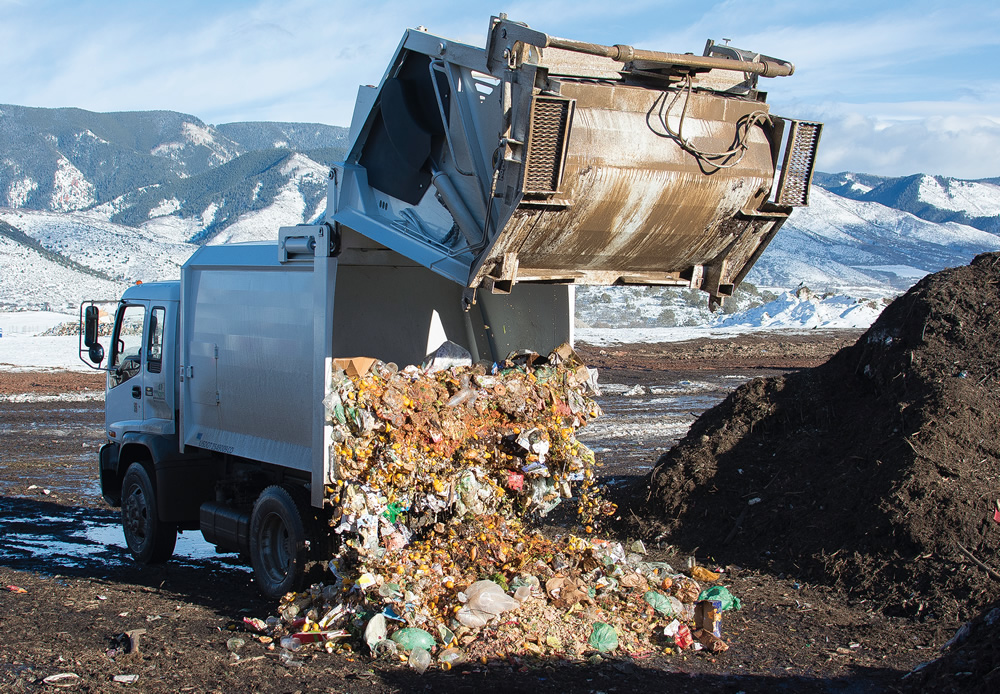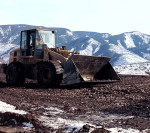“SCRAPS”— a joint program between the City of Aspen and Pitkin County, Colorado — is an example of how motivation and collaboration can propel organics diversion within a municipality.
Nate Clark
BioCycle February 2015
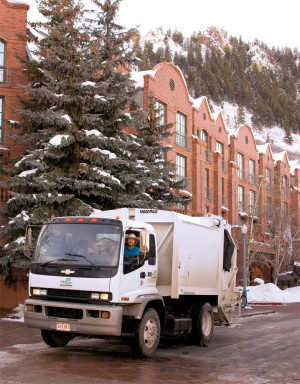
The St. Regis Aspen Resort diverts around 6,000 pounds of food scraps and soiled paper weekly. Photo courtesy of Jeremy Isenhart, City of Aspen
The Pitkin County, Colorado, Solid Waste Center (PCSWC) is the only landfill accessible to the City of Aspen, the nucleus of the county, with the next closest landfill a 45-mile drive away to Glenwood Springs (CO) on winding mountain roads. In 1995, Pitkin County began composting yard trimmings on the landfill’s property to take this material out of the waste stream and create more capacity for nonrecyclable trash. Although successful, diverting only yard trimmings was not enough, and concerns over the landfill reaching capacity continued.
With an established recycling program for plastic and metal containers, paper and cardboard that is built into residents’ trash bills, the next low hanging fruit to increase diversion was food scraps and soiled paper. In May 2010, Ashley Perl, a staff member at the City of Aspen’s Department of Environmental Health and Sustainability (DEHS) wrote a grant to the Colorado Department of Public Health and Environment’s Recycling Resources Economic Opportunity Fund Grant Program for collection and outreach materials to establish a food waste diversion program in the City of Aspen in partnership with Pitkin County. That program, originally named Food Waste Compost Expansion and begun in 2010, is now known as the “SCRAPS” program, and is an example of how motivation and collaboration can propel organics diversion within a municipality.
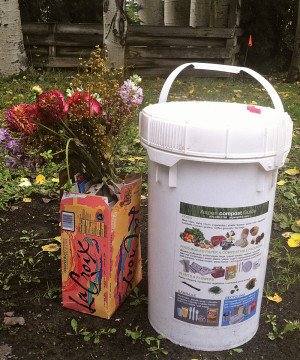
A majority of residential SCRAPS participants choose the 6.5-gallon Life-Latch collection bucket, which comes labeled with source separation information. Photo courtesy of EverGreen Events
Program Design
The SCRAPS program is designed to encourage participation in food scraps diversion by removing barriers to entry. “In partnership with Pitkin County, the City of Aspen’s DEHS offers residents and businesses resources to begin separating out food scraps and soiled paper from their waste stream, and divert that material to composting at the Pitkin County Solid Waste Center,” explains Liz O’Connell, Waste Reduction and Environmental Health Specialist at the DEHS. “Participants receive a free collection container, and educational materials that instruct them on how to effectively participate. All we ask for in return is contact information, but it is not required for participation.”
The 16-gallon Wall Hugger open-top Slim-Jim containers available through SCRAPS are only used in commercial kitchens. The telephone number and website for the City of Aspen DEHS and PCSWC are stickered to the container to facilitate answering participants’ questions. Photo courtesy of Jeremy Isenhart, City of Aspen[/caption]Residents and businesses can choose from four different size containers: a 3-gallon Kitchen Compost Caddy countertop container that can be mounted underneath a sink; a 6.5-gallon Life-Latch collection bucket with a screw-top lid; a 20-gallon Bear-i-cuda bear-resistant container with a screw-top lid; and a 16-gallon Wall Hugger open-top Slim-Jim container. “The 6.5-gallon collection bucket is the most popular among residents,” notes O’Connell. She adds that the 3-gallon container is useful for apartment dwellers who may have a larger, shared compost bin in the trash area, and that the 20-gallon bin comes into play when multiple households want to pool resources and share the cost of collection, or for com mercial entities like restaurants. The 16-gallon open-top Slim-Jim containers are only used in commercial kitchens. In addition, businesses storing compostables outdoors can obtain 65- or 95-gallon Bear-i-cuda animal proof metal collection containers on loan from the SCRAPS program.
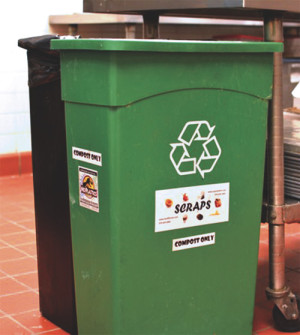
The 16-gallon Wall Hugger open-top Slim-Jim containers available through SCRAPS are only used in commercial kitchens. The telephone number and website for the City of Aspen DEHS and PCSWC are stickered to the container to facilitate answering participants’ questions. Photo courtesy of Jeremy Isenhart, City of Aspen
Many commercial participants also receive larger collection containers from their food waste hauler. Participants in the SCRAPS program have the option of self-hauling organics to the PCSWC and dropping them off for free, or signing up with a collection service. “A majority of participants sign up with a hauler, and a majority of those sign up with EverGreen Events,” says O’Connell. Mountain Rolloffs, Inc., Waste Management, Inc. and the Town of Snowmass Village are the other local haulers offering food waste collection.
Outreach And Education
Refrigerator magnets and stickers with text and images to explain what materials should be composted, recycled or thrown in the trash, are given to residents to educate them on proper source separation. The 6.5-gallon collection bins are stickered with source separation information that includes telephone numbers and website addresses for the DEHS, as well as the PCSWC, in case participants have questions. In addition, O’Connell and Jack Johnson, Public Outreach and Education Coordinator for the PCSWC, will provide in-person training to any participant requesting extra help, including single-family residences, homeowner associations and commercial entities. “We work with residents and businesses to identify obstacles and find ways to address them,” explains O’Connell. “Sometimes participants don’t understand how the program works, or what containers they should be using to fit their needs. We want to individualize the program to each prospective participant, and find solutions to make it work in their own space.”
To promote participation in the SCRAPS program, O’Connell and Johnson conduct outreach through a number of different outlets. “We have done public service announcements on the radio, and advertise in local newspapers and magazines,” explains Johnson. The City of Aspen sends out weekly electronic newsletters to all residents, and on multiple occasions the team has included information and articles on the SCRAPS program in the newsletter. O’Connell and Johnson have also partnered with organizations that want to help promote the program to host events.
“In November 2014, we teamed up with the Community Office for Resource Efficiency (a local nonprofit), and EverGreen Events, to put on a screening of ‘Taste The Waste’, a documentary from German filmmaker Valentin Thurn,” notes Johnson. The film sheds light on the immense volume of food that is wasted from the time it is harvested to the time it reaches a consumer. Shaun McGrath, Administrator of U.S. Environmental Protection Agency Region 8, came to the event to show his support for the program. Also at the event, David Reindel, co-owner of EverGreen Events, set up a table to connect with residents and businesses interested in participating.
O’Connell also conducts direct outreach to commercial entities in the City of Aspen, primarily restaurants and larger institutions like hotels, to increase participation from the business sector. This approach has been successful, which pleasantly surprised Johnson, who thought the SCRAPS program would be a harder sell to the high-end restaurants located in the city. “Foodies get the composting process, and understand where they are in the whole system,” he explains. “Even though I was surprised, I shouldn’t have been.”
Johnson adds that the PCSWC began an offer on January 1, 2015, that provides free food waste drop off to all haulers through July 2015. The goal is to have the haulers pass those savings on to customers, as well as attract new customers by offering limited time discounts on service.
The tipping fee at the PCSWC for standard trash is $52/ton, whereas organic material (i.e. green waste, food waste and compostable products) is $35/ton. Therefore, commercial generators countywide that are able to reduce their trash pick-up service as a result of SCRAPS participation will see financial savings.
The City of Aspen has a pay-as-you-throw (PAYT) trash system for residents and commercial entities, which pay a variable rate based on the volume of trash they set out. This creates a direct financial incentive for everyone in the city to participate in SCRAPS. O’Connell notes that she has met residents who have cancelled their trash service entirely as a result of the SCRAPS program, along with the already established recycling services in the City of Aspen.
Since 2010, around 400 households (out of approximately 7,507 in Pitkin County which includes Aspen) and 10 businesses have signed onto the SCRAPS program, and that number is expected to increase. Johnson and O’Connell note that contamination has not been an issue as more participants begin diverting organics, a result of their education campaigns, as well as the outreach and education conducted by other stakeholders in the program, like David Reindel at EverGreen Events (See Hauler Perspective). In addition to the potential financial savings brought on by participating in SCRAPS, the City of Aspen and the PCSWC have given out discount coupons on finished compost to participants to use in their own garden and landscape operations.
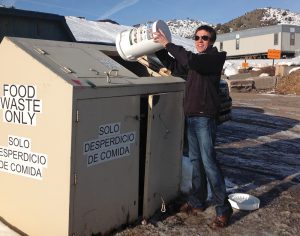
Wheeler Clancy, a residential participant in SCRAPS, notes that separating his food scraps has raised a greater awareness of the waste he produces, encouraging him
to find ways to reduce at
the source. Photo courtesy of the Pitkin County Solid Waste Center
Stakeholder Perspectives
Resident Participant
Wheeler Clancy began source separating his household’s food scraps through the SCRAPS program in late 2013, after some convincing from his girlfriend who grew up composting at her home. “I always assumed there were barriers to diverting food scraps to composting,” explains Clancy. “I didn’t have a spot to do it at my house or a home composting container, and I just guessed it would be too difficult to compost. When I read in the City of Aspen’s weekly electronic newsletter that the city was offering free collection buckets, it sparked my interest and made me realize that this could be easy.”
Clancy received a free 6.5-gallon collection bucket with a screw-top lid, and the refrigerator magnet that explained proper source separation. “The fridge magnet is the best,” notes Clancy. “It made the learning curve pretty easy. We put the scraps in a bowl with a lid on the counter, and every two or three days empty the bowl into the collection container that we keep by the trash. The city [Aspen] makes it a seamless process.” He chooses to self-haul food scraps to the PCSWC because his household does not produce enough weekly volume to merit using a collection service despite its convenience.
Although Clancy originally joined the SCRAPS program because of his girlfriend’s initiative, he does have his own personal incentive as well. “I took sustainability-related elective courses in college, and in one I learned to calculate my personal carbon footprint,” he explains. “I have always had this in the back of my mind — how to take small actions to reduce my footprint. It is hard to make drastic changes like eliminating waste all together, but diverting my food scraps to composting is an easy step that does make an impact. Also, with the local farming movement increasing in our region, composting is a no brainer. It is a great source of fertilizer for local farmers.”
Separating his food scraps has raised a greater awareness of the waste he produces, adds Clancy, encouraging him to find further ways to reduce waste at the source. “I will be chopping up broccoli and realize, for example, how many stems I am putting into my collection container, and this will prompt me to look up other ways to utilize them in a dish. It is so simple to throw away food in the trash and forget about it. When you put those same food scraps in a bowl on the counter top, it builds a much greater awareness of how much waste you are creating. It carries over to other behaviors also. Now when I go to the store, I think about buying in bulk or bringing my own bag. Through the simple action of picking up a compost bucket through the SCRAPS program, I have started to develop a greater awareness of my overall waste.”
Commercial Business Perspective
The St. Regis Aspen Resort is an award winning luxury hotel nestled at the base of Aspen Mountain. In November 2014, the hotel joined the SCRAPS program, and began source separating food scraps and soiled paper. “We started the program in the kitchen, because it is a smaller group of employees, and we wanted to get them up to speed before initiating the program in the front of the house and our cafeteria,” explains Executive Chef David Viviano. “The kitchen staff has line ups [meetings] every day. At the line up, we went through what the food scraps collection containers look like and what can and cannot go into them. With the SCRAPS program, so many food scraps are compostable, even bones can go into the bins. The motto we use is ‘If it ever lived, it can go into the food scraps collection containers’.” Chef Viviano also met with the stewarding team to explain that the containers must be removed when they are full, and brought to the loading dock where they are kept until collection by EverGreen Events.
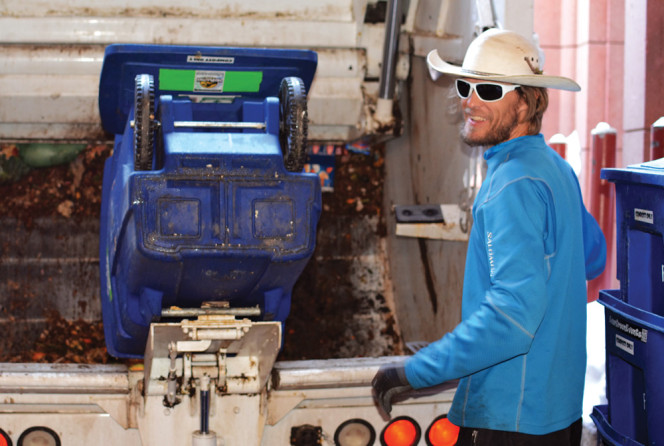
David Reindel, founder and co-owner of Evergreen Events, collecting food scraps from the St. Regis Hotel. Photo courtesy of Jeremy Isenhart, City of Aspen
The St. Regis Aspen Resort utilizes 64-gallon wheeled containers in the kitchen, and the smaller 16-gallon Slim Jim containers when space is limited (i.e. banquets). No compostable liners are used. EverGreen Events provides the 64-gallon wheeled containers, and the 16-gallon Slim-Jim containers are provided through the SCRAPS program. “Once the culinary team was up to speed and the program proved successful, we branched off to the front of the house so we could begin to capture postconsumer food scraps; from there we branched off to the banquets, and finally initiated the program in the St. Regis cafeteria,” explains Chef Viviano. “We use the source separation educational signs provided by the city (Aspen), and have had no issues with contamination.” In addition to the in-house training, Johnson, O’Connell, and Reindel were invited to a full staff meeting to explain the program, as well as motivate staff by discussing the importance of diverting food scraps from the landfill.
The SCRAPS program has been very well received by hotel staff, he adds, and the transition to source separating food scraps and soiled paper has been easy. “Our staff is excited about participating in the SCRAPS program,” he notes. “This is something we are doing at the hotel, but the benefits are for our community. Finished compost from our food scraps is being used to enrich the soil in the Roaring Fork Valley (Western slope of the Rocky Mountains). Mountain soil is not great to grow in, and the ability to enrich it with compost will, in the long run, allow our community to be less dependent on ‘importing’ food. From a chef’s perspective, the benefits of this program are full circle. We separate the scraps, they are taken to our local composting facility, the compost supports local farmers, and then we buy back the food and serve it to customers.” Chef Viviano says that the hotel has also seen financial savings through participating in the SCRAPS program because they have reduced their number of weekly trash collections.
Executive Chef Viviano concluded with a message to other large, foodservice institutions: “Source separation of food scraps can be seen as a daunting task, but it truly and honestly is not. The training is simple — there is nothing to it. Anyone can do it [implement food scraps diversion]. If we are doing it where we are diverting 6,000 pounds of food scraps and soiled paper a week, any restaurant or foodservice organization can do it. It is not extra work. Instead of taking the garbage out, we are taking the food scraps and soiled paper out.” Chef Viviano adds that the storage and cleaning of collection containers are two elements that need to be well planned out for successful implementation.
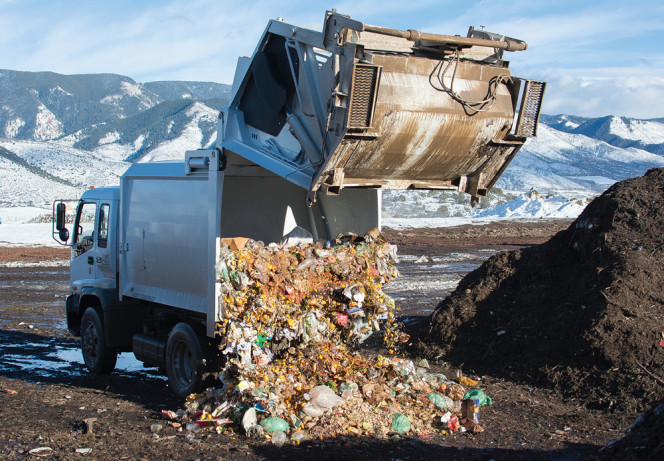
The tipping fee at the PCSWC for organics is $35/ton (compared with $52/ton for standard trash). Photo courtesy of Jeremy Isenhart, City of Aspen
Hauler Perspective
EverGreen Events is a residential and commercial food waste collection hauler started by husband and wife team Alyssa and David Reindel in January 2010. Beginning primarily with zero waste events like the ESPN X-Games, Ironman Triathlons, and community festivals, EverGreen Events started its curbside collection program in Spring 2011 in the Colorado communities of Carbondale, Basalt, Aspen, Snowmass and Snowmass Village. Although the company continues to service events with waste diversion and collection, the advent of SCRAPS has led the business to focus on residential and commercial organics collection.
EverGreen Events has experienced rapid growth as a result of the SCRAPS program. “Everything that the City of Aspen and Pitkin County is doing has increased our customer base,” explains David Reindel. “It is so fantastic working with the city and county, and they are tremendously invested because they want to conserve landfill space and realize there will be challenges when the landfill reaches capacity. Having the city and county on board is a neat partnership and it is unbeatable. They are paving the way for this initiative to succeed.”
Reindel notes that even with the rapid growth of his customer base, the educational outreach conducted by his business, the City of Aspen and Pitkin County has led to minimal contamination and overall program success. “Education is our number one tool to eliminate contamination,” he says. “We produce signage and stickers that are specific to our customer needs. We will hold staff trainings with our customers like O’Connell does, and sometimes O’Connell and I will go together to do trainings. Whether it is a residential or commercial customer, when we see contamination, we approach the customer and address it. Quality is of immense importance because the viability of the SCRAPS program relies on a clean organics stream. To date, we have never had a problem at the PCSWC facility — no loads have ever been rejected and we have never received negative feedback.”
Reindel adds that EverGreen Events is also a licensed Eco-Products distributor, and he will help customers with their upstream purchasing to replace noncompostable items with compostable ones if the need arises. The company is taking advantage of the six-month free food scraps drop off program initiated by PCSWC in January 2015. “We’re currently offering new commercial accounts half-off our normal collection rate for half-a-year, to help them transition away from trash, eventually being able to produce financial benefits from food scraps diversion in the form of reduced trash pick-up frequency and volume.”
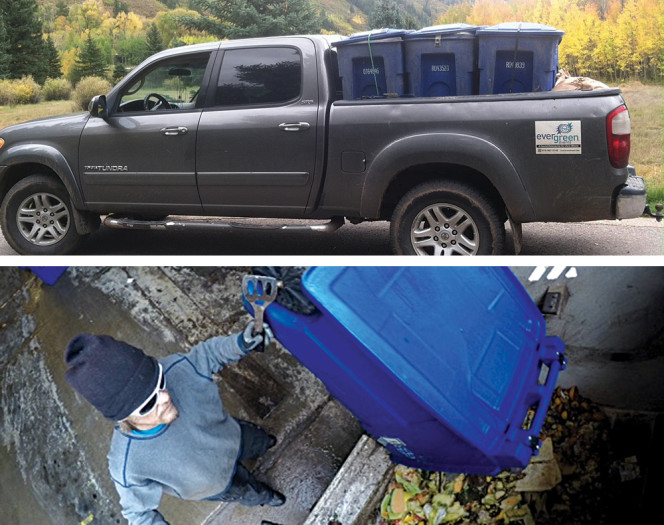
EverGreen Events began its collection service hauling containers in the back of a pickup truck (top), and has since grown rapidly, now utilizing a rear-loading compactor truck (above), referred to by the company as the “mountain compost vehicle”. Photos courtesy of EverGreen Events
Sustainable Strategy
The City of Aspen and Pitkin County have worked hard to make the SCRAPS program successful, because the consequences of a landfill at capacity are vast. “We live in a small, rural, remote community on the western slope of Colorado, and there is never going to be another landfill even if we could afford it — it wouldn’t be allowed by the populace or permitted by our local government,” notes Johnson. “When the landfill closes, we will be trucking trash great distances, and that is not the smartest thing for the environment or the economy.” But as the program has continued to grow, the team has realized the additional benefits that have motivated buy-in among participants. “The primary reason behind the program is landfill space, but we also recognize that we are reducing greenhouse gas emissions,” he concludes. “In addition, we are creating a valuable compost product for the city and county. We want better food security in our area, and having good soil is crucial to that effort. Having good compost will equal good soil.”


